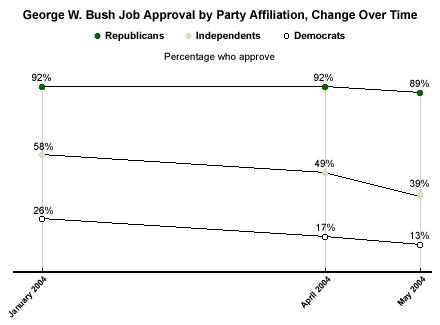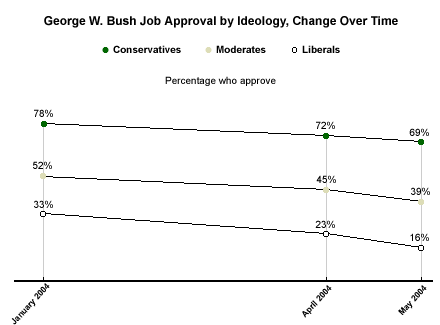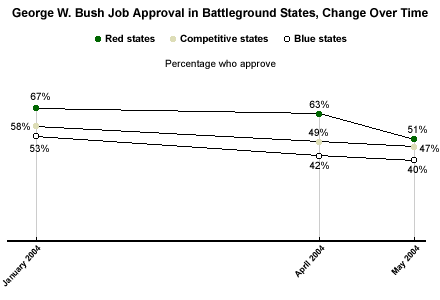The last two Gallup Polls measured the lowest job approval ratings in George W. Bush's presidency (46% and 47%). Bush began the year with a 60% job approval rating, still basking in the glow of the capture of former Iraqi leader Saddam Hussein in mid-December. But as the year has progressed and the war in Iraq has become increasingly problematic, most recently exemplified by the Abu Ghraib prisoner abuse scandal, Bush's approval rating has declined.
While events such as the prisoner abuse scandal help illustrate why Bush's ratings may have fallen, they do not shed light on where he is losing support. In order to assess this, Gallup analyzed aggregated poll data* from early January (when Bush averaged a 60% job approval rating), April (52%), and May (47%) to see how Bush's rating has changed among key demographic and political subgroups. These data allow for a comparison of subgroups' support for Bush at three distinct stages of the year -- the early year high, the initial drop to the low 50s that occurred in mid-January and persisted at those levels until early May, and the drop to the mid-40s in recent weeks.
The analysis shows that Bush's approval rating has dropped across most demographic groups. The notable exception is Republicans, who have remained extremely supportive of the president since January (and throughout his presidency). The initial drop from the 60% range to the mid-50s was most evident among liberal Democrats and independents. His recent drop to the mid-40s has occurred more among conservative Democrats and moderate and liberal Republicans.
Partisanship
Of the most recent presidents, Bush's approval ratings have been the most divided along party lines. In the May 21-23 CNN/USA Today/Gallup poll, 89% of Republicans and only 12% of Democrats approved of Bush, a gap of 77 percentage points. Dating back to Harry Truman, no president has had a gap above 70 points between Republicans and Democrats in a Gallup Poll in a re-election year. Since January, Bush's approval rating has dropped among both independents and Democrats. In January, 26% of Democrats approved. That fell to 17% in April, and 13% in May. Independents' support for Bush has fallen 19 points, from 58% in January to 39% in May.
Meanwhile, Bush has been able to hold on to almost all of his Republican support. His approval rating among Republicans was 92% in January, 92% in April, and 89% in May.

Ideology
Bush's approval ratings have dropped among all ideological groups, but less so among conservatives than liberals or moderates. Sixty-nine percent of self-identified conservatives currently approve of Bush, down slightly from 72% in April and 78% in January. In January, 52% of self-described moderates approved of Bush; now, only about two in five (39%) do. Since January, Bush's support among self-identified liberals has been halved, from 33% to 16%.

An analysis of partisanship and ideology reveals that Bush's two approval rating drops this year have come disproportionately from different subgroups. The following table displays Bush's job approval ratings at three points among partisan and ideological groups. (In these data, independents who lean to the Democratic or Republican Party are included with those who initially identify as Republicans or Democrats.)
Percentage of Approving of Bush's Job as President by Partisan and Ideological Groups, 2004
|
January |
April |
May |
|
|
Overall |
60% |
52% |
47% |
|
Liberal Democrats |
20% |
11% |
10% |
|
Moderate Democrats |
28% |
19% |
13% |
|
Conservative Democrats |
35% |
29% |
21% |
|
Pure Independents |
58% |
41% |
40% |
|
Moderate/Liberal Republicans |
89% |
86% |
76% |
|
Conservative Republicans |
95% |
92% |
92% |
The initial drop in Bush's approval ratings this year came disproportionately among pure independents (those who do not lean toward either party) and liberal and moderate Democrats. While Bush's overall rating fell eight points from 60% in January to 52% in April, his rating among pure independents dropped 17 points and dropped 9 points among both liberal Democrats and moderate Democrats. Conservative Democrats, conservative Republicans, and moderate and liberal Republicans showed smaller declines in support during that period.
In recent weeks, Bush's overall job rating has decreased from 52% in April to 47% in May, but has not changed among pure independents, liberal Democrats, or conservative Republicans. Rather, most of the drop has occurred among moderate and liberal Republicans (10-point decline since April), conservative Democrats (8-point decline), and moderate Democrats (6-point decline). This could be troubling for Bush, as these groups may be key to election victory. Assuming conservative Republicans are already solidly in the Bush camp and liberal Democrats are already backing John Kerry, Bush will need to win the vast majority of moderate and liberal Republican votes, and hope to gain some support from conservative Democrats, especially in key swing states such as Florida, Michigan, and Ohio.
Bush's declining political fortunes are evident in the views of other key demographic groups, especially by gender, race, and age.
Gender
Throughout his presidency, Bush's job approval rating has been lower among women than among men. Such a gender gap has been evident in ratings of presidents since Ronald Reagan. Over the past five months, Bush's rating has decreased about equally among both men and women.
- Among men, the president's approval rating decreased 12 points, starting at 63% in January, then decreasing to 57% in April, and finally to 51% in May.
- Bush's approval ratings among women decreased 14 points since January, from a high of 56% in January, to 48% in April and 42% in May.
Race
Bush's job approval rating decreased more among whites than blacks, but that is mainly because only 20% of blacks initially approved of Bush in January.
- In January, nearly two-thirds of whites, 65%, approved of Bush, but this percentage dropped to 57% in April and then to 51% in May.
- Among blacks, Bush's rating fell from 20% in January, to 16% in April and 12% in May.
Age
The smallest drop in Bush's approval rating was among Americans aged 50 to 64 -- just four points -- while his ratings dropped 13 points or more among all other age groups.
- Among 18- to 29-year-olds, presidential approval dropped 13 points, from 57% in January to 44% in May.
- Bush's greatest decline appeared among 30- to 49-year-olds. The January data show 66% of those aged 30 –to 49 approving of Bush, while just 49% currently approve.
- Approval for Bush declined only four points among 50- to 64-year-olds, from 54% at the beginning of the year to 50% now.
- Among Americans aged 65 and older, Bush approval decreased 14 points since the beginning of the year. Fifty-four percent of Americans in this age group approved of Bush in January. Now, only 40% approve.
Education
So far this year, respondents with a postgraduate education have been the least likely of any education group to approve of the way Bush is handling his job.
- Bush's approval rating started the year at 48% among those with postgraduate educations; they stayed at 48% in April before dropping to 40% in May.
- Among those with a four-year college degree and no postgraduate education, 64% approved of Bush in January, but this percentage declined to 57% in April, and to 53% this month.
- Among respondents with just some college education, Bush's approval rating decreased from 66% to 55% to 47%, respectively, during these three periods.
- Among those with a high school education or less, Bush's rating decreased from 57% in January, to 49% in April, and to 47% in May.
A Note on Battleground States
Looking at the 2000 Electoral College map, 51% of residents in states Bush won comfortably (by six or more percentage points) currently approve of him. Just 40% of those in states Al Gore won comfortably now approve of Bush. In the battleground states -- those in which the winning candidate won by five percentage points or fewer -- 47% of residents approve. Support for Bush in these key states fell below the majority level in recent weeks, after being at 58% in January. Bush also had majority approval (53%) in the "blue" or Gore states in January.

*Results are based on two-poll aggregates of approximately 2,000 respondents. Polls were conducted Jan. 2-5 and Jan. 9-11, April 5-8 and April 16-18 and May 7-9 and May 21-23. For each two-poll aggregate, the maximum margin of error attributable to sampling is ±2 percentage points. For subgroups, the margins of error are higher. For example, in the January data the margin of error for the 165 blacks is ±8 percentage points, while for the 1,660 whites it is ±3 percentage points.
